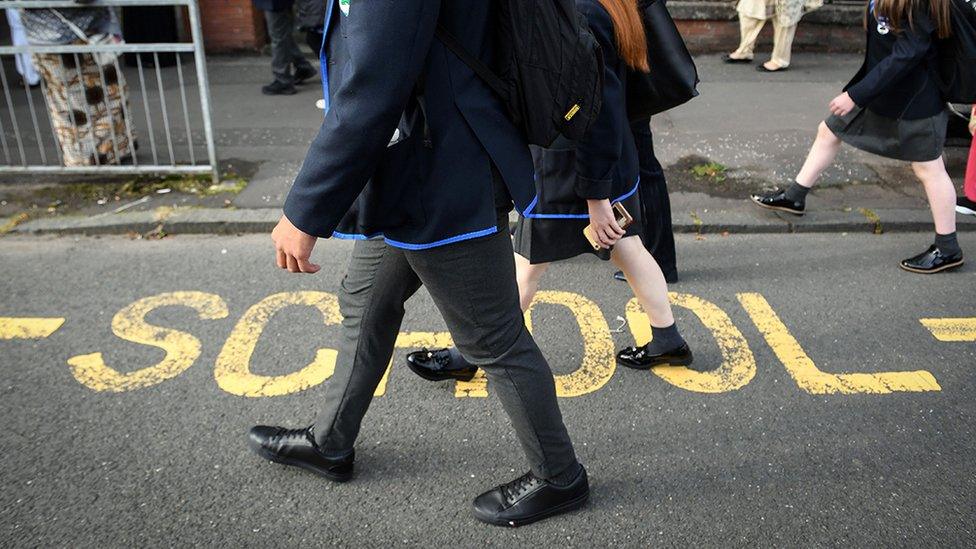'Christian focused' RE should be scrapped in schools, study says
- Published

Some respondents said the university connection could present huge opportunities for pupils
Laws which mean schools have to teach "Christian focused" Religious Education (RE) and hold a daily act of collective worship should be scrapped, an Ulster Ulster (UU) research paper has said.
It says more "controversial issues" should be taught in classrooms.
There should also be "joint community schools" rather than religiously segregated ones.
Those are some of the suggested changes to NI's education system.
The paper, from UU's Unesco Education Centre, sets out a "vision" for a single education system.
It also said that Northern Ireland could not afford the current "costly, inefficient and unsustainable" system.
But while the paper sets out its vision for a single school system, it also outlines a number of obstacles to that.
"Segregation is still endemic in the current system and has proven to be resolutely resistant to almost every effort to introduce progressive reform," the paper said.
The New Decade New Approach (NDNA) deal previously said the education system in Northern Ireland, with a range of sectors and school types, was "not sustainable".
An independent review of the education system, as promised in NDNA, is under way and is due to report in 2023.
But the chair of the review body Dr Keir Bloomer has previously said there was no agreement on what a "single education system" might look like.
The UU paper calls the independent review's task "daunting - not least in determining what is actually meant by the term single education system".
A previous paper in the UU Unesco Education Centre series called Northern Ireland's Education System "divided, splintered and overly expensive".
For instance, the Department of Education (DE) funds eight separate arms-length bodies involved in running schools, as well as the Education Authority (EA).
'Segregation'
The latest paper in the UU Transforming Education series also calls Northern Ireland's education system "Christian-centric".
"In order to be provided with state funding, all schools in NI must operate within a system of legislation that is underpinned by a specifically Christian worldview," it said.
"The influence of a Christian-centric perspective pervades not only the daily routine (act of worship) and timetable (the content of the RE syllabus) but also the operational day-to-day and strategic management of schools and, to some extent, the management of the entire education system."
The paper said the way schools were governed solidified "community separation" and that many pre-schools were also segregated.
"In effect, the current system ensures that most of our children are segregated by community background from the age of three," it said.
The authors also argue that academic selection leads to segregation of children on the basis of "socioeconomic status".
In response to the shortcomings they identify, their paper argues for a single education system based on a number of changes.
It said that what pupils studied should be more flexible and based on their needs, and schools should not be "largely evaluated against a narrow measure of academic success".
The paper also said that how and where teachers are trained needs to change.
It calls for two university colleges to train teachers rather than the current four and says that teachers from different religious backgrounds should be trained together rather than separately.
The authors also call for a repeal of laws which require schools to teach Religious Education (RE) and hold a daily act of worship.
"Church involvement in the drawing up of the RE specification needs to be revised in order that a genuinely pluralistic and inclusive programme of education can be developed, delivered and quality assured in practice," it added.
In July, the High Court ruled that the exclusively Christian-focused religious education (RE) taught at primary schools in Northern Ireland was unlawful.
However, it is as yet unclear how this will change the teaching of RE in schools.

The research paper says NI needs "radical change" in creating a single education system
The UU report also calls for a number of other changes to the education system, including a new curriculum, and a move away from the success of a school being measured by exam results.
"Communities have to hear what other communities think, and individuals have to learn to negotiate difference rather than avoid it," the paper said.
The authors also said a single education system would be based on "cross-community" schools and all-ability post-primary schools.
That would mean that academic selection at 11 would be scrapped.
"We need radical change, not tinkering about the edges, and our communities need leaders who are brave enough to articulate the need for change to their communities and bring them along on a journey of improvement," the paper concluded.
"This journey will be difficult for some but as a society we cannot afford, in all the meanings of the term, to retain the current system."
Related topics
- Published5 July 2022

- Published11 November 2021

- Published17 February 2021
